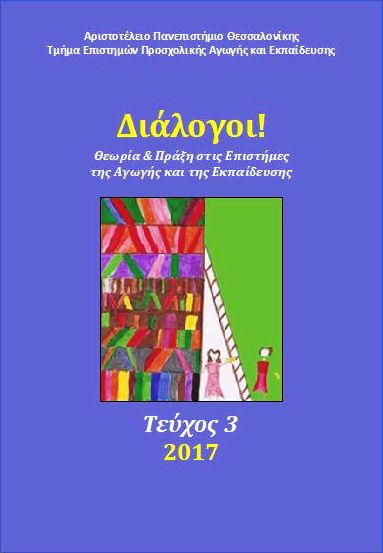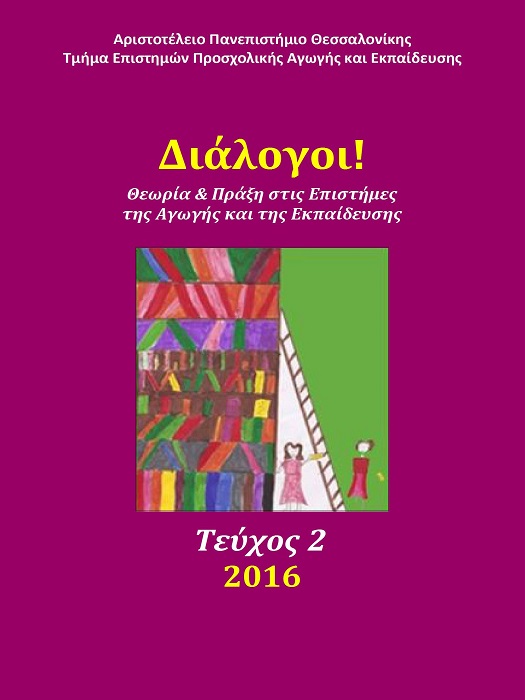Διαλογικές πρακτικές προς μια συμμετοχική προσχολική εκπαίδευση: Ένα μοντέλο υποστήριξης των εκπαιδευτικών

Περίληψη
Η παρούσα έρευνα έχει ως αντικείμενο τη μελέτη των διαδικασιών και των αποτελεσμάτων μιας συνεργατικής έρευνας-δράσης, που υποστήριξε τους εκπαιδευτικούς να βελτιώσουν/αλλάξουν τις διαλογικές πρακτικές τους κατά τη μαθησιακή διαδικασία. Σκοπός της έρευνας ήταν η διερεύνηση των διαλογικών πεποιθήσεων και πρακτικών των εκπαιδευτικών στην προσχολική εκπαίδευση καθώς και η διερεύνηση της αποτελεσματικότητας των διαδικασιών υποστήριξής τους, με σκοπό τη βελτίωση των εκπαιδευτικών διαλογικών πρακτικών στη μαθησιακή διαδικασία. Η συγκεκριμένη έρευνα αξιοποιεί δεδομένα από μια συνεργατική έρευνα-δράση, με οκτώ νηπιαγωγούς, που διήρκεσε ένα χρόνο και συμπεριέλαβε ατομικές συνεντεύξεις με τις νηπιαγωγούς, ομαδικές συναντήσεις και μαγνητοφωνημένες καταγραφές των διαλογικών πρακτικών τους. Τα αποτελέσματα της μελέτης έδειξαν ότι παρά τη διαφοροποίηση των πεποιθήσεων των νηπιαγωγών σχετικά με το νόημα και τη διαδικασία του διαλόγου, οι διαλογικές πρακτικές τους ήταν παρόμοιες, αναδεικνύοντας τη λεκτική κυριαρχία του εκπαιδευτικού μέσα στην τάξη και τον παθητικό ρόλο που έδιναν στα παιδιά, περιορίζοντας μ’ αυτόν τον τρόπο τις ευκαιρίες για συμμετοχή των παιδιών σ’ έναν δημοκρατικό διάλογο. Παρόλα αυτά, τόσο οι πεποιθήσεις όσο και οι διαλογικές πρακτικές των νηπιαγωγών που συμμετείχαν στην έρευνα-δράση τροποποιήθηκαν μέσω της υποστήριξής τους σε θεωρητικό, ερευνητικό και στοχαστικό επίπεδο. Τα αποτελέσματα της παρούσας έρευνας συζητιούνται στο πλαίσιο της επαγγελματικής μάθησης των εκπαιδευτικών με σκοπό τη βελτίωση του εκπαιδευτικού έργου μέσω της επανατοποθέτησής τους σχετικά με τις πεποιθήσεις και τις πρακτικές τους για τη διαλογική διαδικασία και τη μάθηση.
Λεπτομέρειες άρθρου
- Πώς να δημιουργήσετε Αναφορές
-
Likomitrou, S., & Avgitidou, S. (2017). Διαλογικές πρακτικές προς μια συμμετοχική προσχολική εκπαίδευση: Ένα μοντέλο υποστήριξης των εκπαιδευτικών. Διάλογοι! Θεωρία και πράξη στις επιστήμες αγωγής και εκπαίδευσης, 3, 69–96. https://doi.org/10.12681/dial.14361
- Τεύχος
- Τόμ. 3 (2017)
- Ενότητα
- Επιστημονική Αρθογραφία

Αυτή η εργασία είναι αδειοδοτημένη υπό το CC Αναφορά Δημιουργού – Μη Εμπορική Χρήση – Παρόμοια Διανομή 4.0.
Οι συγγραφείς των άρθρων που δημοσιεύονται στο Διάλογοι! Θεωρία και Πράξη στις Επιστήμες Αγωγής και Εκπαίδευσης διατηρούν τα δικαιώματα πνευματικής ιδιοκτησίας επί των άρθρων τους, δίνοντας στο περιοδικό το δικαίωμα της πρώτης δημοσίευσης. Άρθρα που δημοσιεύονται στο Διάλογοι! Θεωρία και Πράξη στις Επιστήμες της Αγωγής και Εκπαίδευσης διατίθενται με άδεια Creative Commons 4.0 και σύμφωνα με την άδεια μπορούν να χρησιμοποιούνται ελεύθερα, με αναφορά στον/στη συγγραφέα και στην πρώτη δημοσίευση για μη κερδοσκοπικούς σκοπούς και με δικαίωμα τροποποίησης μόνον με παρόμοια διανομή (αν αναμείξετε, τροποποιήσετε, ή δημιουργήσετε πάνω στο υλικό, πρέπει να διανείμετε τις δικές σας συνεισφορές υπό την ίδια άδεια όπως και το πρωτότυπο).
To Τμήμα Επιστημών Προσχολικής Αγωγής και Εκπαίδευσης του Αριστοτέλειου Πανεπιστημίου Θεσσαλονίκης και το Εθνικό Κέντρο Τεκμηρίωσης διατηρούν το δικαίωμα να δημοσιεύουν, να αναπαραγάγουν, να παρουσιάζουν στο κοινό, να διανέμουν και να χρησιμοποιούν άρθρα που δημοσιεύονται στο Διάλογοι! Θεωρία και Πράξη στις Επιστήμες Αγωγής και Εκπαίδευσης σε οποιοδήποτε μέσο και μορφή είτε μεμονωμένα είτε ως μέρη συλλογικών έργων, για όλο το χρόνο διάρκειας προστασίας της πνευματικής ιδιοκτησίας και για όλες τις χώρες του κόσμου.
Αυτό περιλαμβάνει ενδεικτικά, και όχι αποκλειστικά, το δικαίωμα δημοσίευσης των άρθρων σε τεύχη του περιοδικού Διάλογοι! Θεωρία και Πράξη στις Επιστήμες Αγωγής και Εκπαίδευσης, αναπαραγωγής και διανομής μεμονωμένων αντιγράφων των άρθρων, αναπαραγωγής ολόκληρων των άρθρων σε άλλη έκδοση του Τμήματος Επιστημών Προσχολικής Αγωγής και Εκπαίδευσης του Αριστοτέλειου Πανεπιστημίου Θεσσαλονίκης και του Εθνικού Κέντρου Τεκμηρίωσης και αναπαραγωγής και διανομής των άρθρων ή περίληψης αυτών με χρήση πληροφορικού συστήματος αποθετηρίου.



